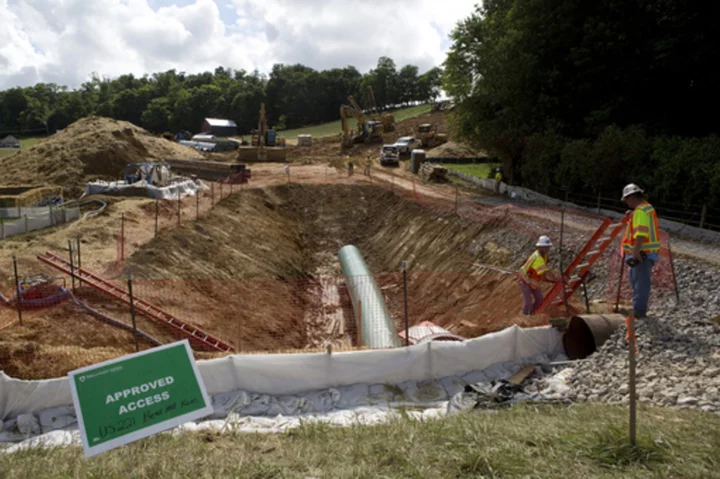CHARLESTON, W.Va. (AP) — A controversial and long-delayed natural gas pipeline got the green light for construction on national forest land in Virginia and West Virginia after the U.S. Forest Service reissued approval for a permit, despite past federal appeals court rulings determining developers had “inadequately considered” the project's environmental impact.
Monday night's decision will allow the $6.6 billion Mountain Valley Pipeline to be built — for now — across a 3.5-mile (5.6-kilometer) corridor through the Jefferson National Forest.
The 303-mile pipeline would transport natural gas that's drilled in Ohio and Pennsylvania across rugged slopes in the Appalachian Mountains. Environmental groups say construction has led to violations of regulations meant to control erosion and sedimentation.
Mountain Valley Pipeline LLC, the joint venture behind the project, still has other federal permits it will need approved as it works to complete the pipeline by the end of this year.
Environmental advocates like Wild Virginia Conservation Director David Sligh said on Tuesday that the Biden administration is favoring fossil fuels even as it “claims to advance environmental justice.”
“This is the third time those who should guard our public treasures have failed us,” Sligh said.
In previous litigation, the 4th U.S. Court of Appeals has twice vacated U.S. Forest Service decisions allowing for the pipeline in the Jefferson National Forest.
Sligh also said the pipeline “remains far from completion,” alleging 88 miles of the proposed route is still incomplete in Virginia.
That's despite assurances the project is almost finished from developers and pipeline-supporting politicians like Sen. Joe Manchin, a Democrat from West Virginia.
Manchin said Tuesday the natural gas line is “a crucial piece of energy infrastructure,” that's good for global supply and American energy security. The fact that the U.S. Forest Service has approved construction three times shows “the review has been exceptionally thorough,” he said in a statement.
In a separate decision, the 4th U.S. Circuit Court of Appeals revoked a key water permit last month because it said West Virginia's environmental protection agency didn’t adequately address the pipeline’s history of water quality violations. It also ruled that the agency used the wrong standards to support the decision that in-stream activities would meet state water quality regulations. The permit is required under the federal Clean Water Act.
The court noted at least 46 water quality violations and assessed civil penalties totaling roughly $569,000.
U.S. Forest Service officials said in the agency's decision Monday that the amended plan will permit the project to move forward while “minimizing environmental impacts to soils, water, scenery and other resources.”
The plan contains requirements like one that 85% of soils dedicated to growing vegetation be left in place and that revegetation of the area be completed within five years, with the exception of the construction zone and right-of-way.
Jill Gottesman, a top regional director for The Wilderness Society, said in a statement this week that the decision means groups like hers opposing the project will have “no choice but to take this battle back to court.”
“The Forest Service has bent to the will of the oil and gas industry, and is placing fossil fuel profits above our environment and public safety,” she said.

